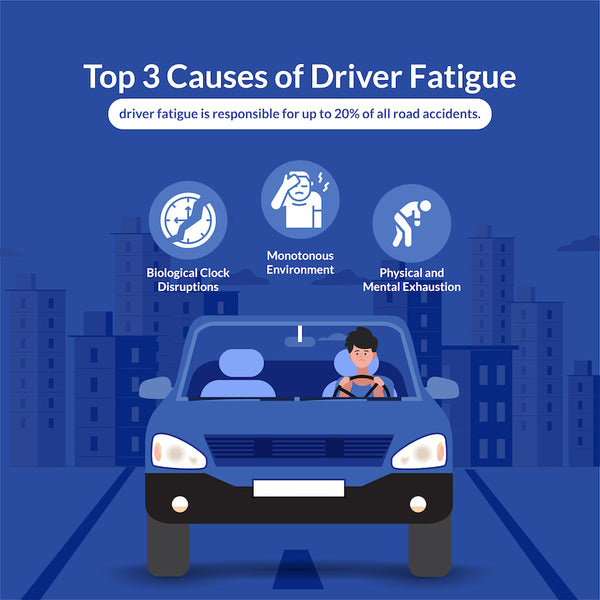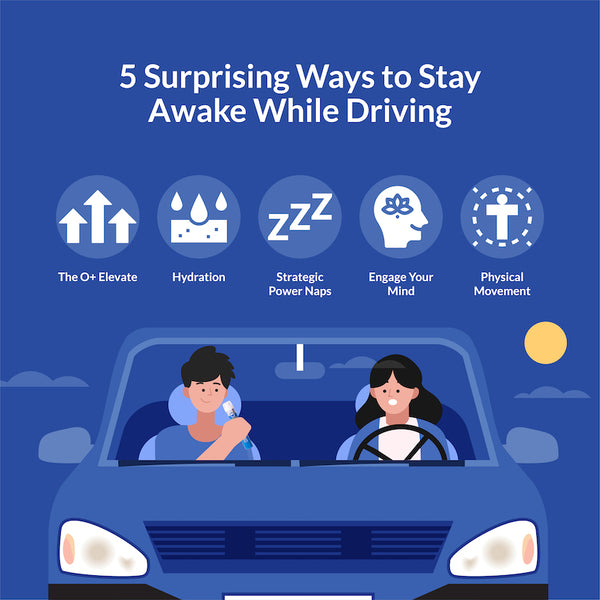Your Cart is Empty
Driving is an essential part of our daily lives. Whether it's a short trip to the grocery store or a long road trip across the country, it’s essential to remain alert behind the wheel. According to a recent study, driver fatigue is responsible for up to 20% of all road accidents. People often wonder: "Why do I get sleepy when I drive?" This article will explore the science behind driver fatigue, share some statistics, and offer surprising ways on how to stay more alert behind the wheel.

There are many contributing factors to driver fatigue, which can be avoided with better understanding and a few simple tricks. Let’s look at three common causes behind driver fatigue and the science behind it.
At the core of our body's sleep-wake cycle is an intricate mechanism known as the circadian rhythm. This self-sustaining internal clock is driven by the brain's suprachiasmatic nucleus and responds to cues like light and temperature. Its primary function is to regulate various physiological processes, most notably the sleep-wake cycle, which in turn dictates our levels of alertness throughout a 24-hour period. Typically, this rhythm aligns with the day-night cycle, making us feel awake during daylight hours and sleepy at night. However, activities that conflict with this natural cycle, like driving during periods our body identifies as 'rest times' (late at night or the wee hours of the morning), can upset the rhythm. Such disruptions can misalign our alertness with our activities, making us susceptible to sleepiness, even if we believe we had a full night's rest.
When embarking on lengthy drives, especially on highways or long, unchanging roads, drivers can fall victim to a phenomenon known as 'highway hypnosis.' This is a trance-like, meditative state brought about by the monotony of the environment. The repetitive nature of the road, coupled with the consistent hum of the vehicle, can lull the brain into a passive state, much like a metronome's consistent tick can induce relaxation. However, this seemingly benign autopilot state can be treacherous. If the driver's active cognitive engagement diminishes, their reaction times may suffer, making it difficult to respond quickly to changes in the driving environment. What starts as a momentary zoning out can escalate into full-blown drowsiness, making highway hypnosis a silent but dangerous precursor to driver fatigue.
Beyond the body's natural rhythms and external environment, personal factors play a pivotal role in driver alertness. An exhausting day at work, whether it involves physical labor, intense cognitive tasks and/or emotional upheaval can sap energy levels. The body and mind require adequate rest and recuperation after strenuous activity. Without proper recovery, tiredness can persist, making certain tasks that demand focus and attention, such as driving, more risky. Emotional stress, which is often overlooked, can also cloud judgment, slow reaction times and diminish focus. The cumulative effect of these stressors sets the stage for driver fatigue, a state where even the most experienced drivers can find it challenging to maintain the necessary vigilance on the road.
The implications of driver fatigue on road safety cannot be overstated, and numerous studies have cemented its place as a significant concern. One such revelation emerges from research published in the Journal of Sleep Research. According to one study, driver fatigue is responsible for up to 20% of all road accidents. To put this in perspective, one out of every five accidents on the road could be the result of a driver's impaired alertness due to tiredness. Such statistics present the critical nature of the problem, making it important to raise awareness and provide solutions – the primary of which is quality sleep – to reduce this number.
Furthermore, a study from the American Journal of Preventive Medicine brings to the forefront another concerning part of the problem. According to this study’s findings, drivers operating on a sleep duration of less than five hours have a significantly higher risk of being involved in a car crash. This risk dramatically contrasts with people who have had sufficient sleep, which the study defines as a duration of seven hours or more. This correlation between limited sleep and increased crash risk not only underscores the vital role of adequate rest in safe driving, but also serves as a cautionary note. It suggests that pushing one's limits, in terms of operating with minimal sleep, isn't merely a matter of fighting off fatigue behind the wheel. Instead, it's a game of Russian roulette with drastically increased odds of a catastrophic outcome – to self and others.

One of more recent ways to increase focus and mental energy is with the use of recreational oxygen. The O+ Elevate Pack, from Oxygen Plus, provides drivers a refillable, portable delivery system that offers more than five times the concentration of oxygen found in everyday air. O+ oxygen can help increase alertness and mental clarity. Inhaling three to five breaths usually does the trick.
Dehydration can significantly affect your concentration levels. Ensure you drink ample water throughout the day, and especially along your journey. Even mild dehydration can impair your mood, memory and cause feelings of fatigue.
A short 10- to 20-minute nap can recharge your energy levels. If you feel the signs of fatigue coming on, pull over in a safe spot and have a brief snooze. It can make a massive difference in your alertness.
Listening to podcasts, audiobooks, or upbeat music can help break the monotony of the road and keep your brain engaged. This mental stimulation can be an effective way to combat the lull of long drives.
Every couple of hours, pull over at a rest stop or gas station. Stretch your legs, do some quick exercises, or even just walk around for a few minutes. Physical movement boosts blood circulation and can help to wake you up.
Understanding why you get sleepy when driving is the first step to ensuring you remain alert on the road. Whether it’s the disruption of your circadian rhythm, the monotony of the drive, or general exhaustion, recognizing these factors can be a lifesaver. With these five tips you can help the roads be more safe and help reduce the risk of accidents caused by driver fatigue.
